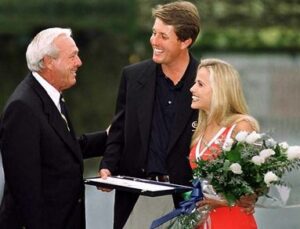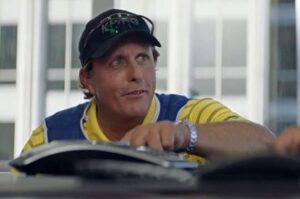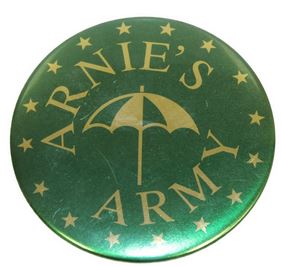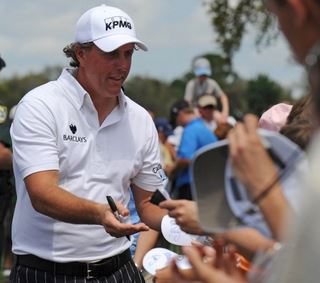Podcast: Play in new window | Download
Subscribe: RSS
I remember the first time I saw Phil Mickelson play golf in person.
After dominating college golf for four years at Arizona State (including earning a degree in Psychology in 1992), the tall (6’3”) young left handed golfer had just come onto the PGA Tour wearing a confident smile and a sincere “This is fun!” look on his face.

I had taken my wife and two sons out to see him play golf and, hopefully, give the boys a little encouragement to take up the game, too. (It worked!)
We saw young Phil striding confidently down the fairway as he was taking in all the sights. Like Arnold Palmer in the 1950’s-1970’s, Mickelson would quickly become one the most approachable and fan-friendly golfers on the professional circuit. Though most pro golfers are quite serious about their game, Phil’s incredible golf talent along with his positive rapport with golf fans quickly established him as one of the PGA Tour’s most popular players.
Phil Mickelson’s personality has helped him to become one of the most sought-after sports celebrities by the advertising community, too. While he was winning 45 PGA events and several major championships, Mickelson’s personal marketability banked significantly more dollars than he has won playing professional golf.
During his era in professional golf, Phil Mickelson is the second most successful golfer on the PGA Tour. Had Tiger Woods opted to play professional tennis instead of golf, it’s quite possible that Phil Mickelson may have been the one to make a run at Jack Nicklaus’ record of 18 professional major championship titles.
Last year, the talented 50-year old Mickelson became the oldest PGA golfer to win a major at the PGA Championship at Kiawah Island, Georgia. It was Lefty’s sixth professional major championship. He now trails only Nicklaus (18), Tiger Woods (15), Walter Hagen (11), Ben Hogan and Gary Player (9 apiece), Tom Watson (8), along with Bobby Jones, Arnold Palmer, Sam Snead, Harry Vardon, and Gene Sarazen (7 each).
Meanwhile, corporate Phil Mickelson has remained an advertising force. In recent years, he still raked in upwards of $40 million per year in corporate sponsorships. Though Tiger Woods may have won more tournaments and has a worldwide following, Phil Mickelson’s likeability has helped make him into a household name, too. Golfers of all ages identify with Phil’s “Go for broke” mentality while maintaining a pleasant demeanor on the course. He has been today’s version of Arnold Palmer.

With his win at last year’s PGA Championship, Phil Mickelson has been expected to defend his title two weeks from now at Southern Hills Country Club in Tulsa. Maybe.
Several weeks ago, I wrote about the predicament which Phil Mickelson put himself into a few months ago. He wants the PGA Tour to give an OK to his participation in a new Greg Norman-led golf league sponsored by some very wealthy Saudi Arabian backers. The first of eight summer tournaments for this fledgling league will be played in London a month from now. The new league’s schedule pauses to allow golfers a chance to participate in June’s US Open and The Open (British Open) in July.
However, this assumes that the PGA Tour and R&A (Europe) are willing to let them play.
The PGA Tour has firmly announced that its members can either play on the PGA Tour or the new tour, but golfers cannot compete in both.
Phil Mickelson and a few other established PGA stars such as Lee Westwood have asked the PGA Tour to grant an exemption and allow them to play in one or more of the Saudi League events.
For Phil Mickelson, the upstart new golf tour has offered him upwards of $30 million in guaranteed appearance money. As long as the 51-year old Mickelson shows up to play golf in their events, he will cash a big check regardless of how well he performs on the course.
Many of Mickelson’s contemporaries are now playing golf on the PGA Champions Tour (ages 50 and older) where the winner generally earns about $300,000 per event. Playing in the senior sandbox, Mickelson would need to win 100 PGA Champions Tour events (which would take nearly four years assuming he won every single event!) to equal to the $30 million he has been offered this summer to play in the Saudi-sponsored golf tournaments.
Phil Mickelson has won almost $95 million in prize money in his career on the PGA Tour. He has earned several times that amount in commercial endorsements over his 31-years in pro golf.

Though professional golfers are considered to be an independent contractor and pay for their own expenses (travel, lodging, caddie, etc.), Mickelson should be financially set for life.
Does Phil Mickelson really need the short-term money ($30 million) or does he simply not want the PGA Tour dictate which golf tournaments he can and cannot play in?
In an upcoming biography to be released May 17, the author of Phil Mickelson’s life story revealed Thursday that Lefty’s penchant for gambling has become a very expensive habit.
The national news headlines are buzzing as the book’s author claims Mickelson had gambling losses of about $10 million per year over a 4-year stretch during the past decade. Despite all of Phil Mickelson’s earnings as a golfer and commercial deals, the book suggests that it is quite possible that Mickelson may, indeed, really need the current income being offered by the Greg Norman/Saudi Tour this summer.
Golfers are the ultimate perfectionists. As a fellow golfer (though certainly not as talented), this sport tends to attract loners who are rarely satisfied with the final score. The chasing of perfection – both on and off the golf course – makes some golfers quite vulnerable to other types of addictive behaviors.
Golfers such as John Daly (alcohol), Dustin Johnson (drugs), and Matthew Wolf (mental health/stress) have made the sports headlines in recent years. Of course, Tiger Woods’ addictive issues of another type cost him his marriage and forever damaged his personal reputation as a commercial pitchman, too.
This week’s confirmation that Phil Mickelson has a tragic gambling addiction is another sad day for golf fans. Could the need to cover his gambling losses be the primary reason why Phil is turning to the guaranteed money being offered by the new golf league this year?
Let’s hope not.
Not taking anything away from today’s other popular golfers, Phil Mickelson’s incredible magnetic personality with his fans (young and old) puts him in rarified air with the greatest golf personality of all time, Arnold Palmer. Phil’s Fanatics have been every bit as enthusiastic as Arnie’s Army of the 1960’s.
If Phil should decide to go to war with the PGA Tour (whether on personal principle or to cover his gambling debts or both), I think that everyone loses except, perhaps, his bookies.
Phil Mickelson will be a shining star for the PGA Champions Tour for as long as he remains healthy and interested in playing. The senior circuit has tremendous competition but could use a box-office boost from Phil Mickelson whenever he is ready to tee it up on a regular basis.
Twenty-five years from now, I think most of golf fans would like to see The Masters’ ceremonial tee shot being made by 3-time champion Phil Mickelson and the 5-time champ, Tiger Woods.
In the final chapter of his book “A Life Well Played”, Arnold Palmer (who truly disliked being called “The King”) speculated about what he wanted his own legacy to be. He humbly confided, “So, if I enhanced the game and people’s enjoyment of the game, I would feel like I have accomplished something.”

Though Arnie remains my personal golf hero, he wasn’t a saint all the time, either. None of us are. It is, however, important to think about your legacy while you still have a chance to shape it.
I pray that Phil Mickelson is getting help for gambling issues (if he hasn’t already done so) and comes clean with his fans. We will understand – just like Tiger Woods’ fans have roared back to support him in the last few years, too.
Golf is simply more entertaining with Phil Mickelson being a big part of it!
If you have a gambling issue, please call 1-877-770-STOP or www.gamblersanonymous.org

